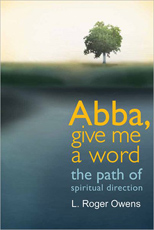"We need a warning: pay attention.
"And we might need it from a spiritual director whose job it is to direct our attention again and again back to the present, back to our own lives, away from the rabbits we chase and the anxious distractions, and to what God might be saying to us now.
"But even if you don't have a spiritual director, you've already gotten this warning from the best spiritual director of all.
" 'I tell you, do not worry about your life, what you will eat or what you will drink, or about your body, what you will wear. Is not life more than food, and the body more than clothing? Look at the birds of the air; they neither sow nor reap nor gather into barns, and yet your heavenly Father feeds them. . . . Consider the lilies of the field, how they grow; they neither toil nor spin. . . . So do not worry about tomorrow, for tomorrow will bring worries of its own. Today's trouble is enough for today.'
"This is a warning from someone who, with a cross looming in his future, had plenty to worry about. And yet he gives advice about worry that has been turned into an old, worn-out cliche: stop and smell the roses.
"I've spent a lot of time thinking about this passage, perhaps because I am congenitally (and perhaps habitually) anxious. And I have come to believe that Jesus' command to 'look at the birds' and 'consider the lilies' is more than just an illustration to show how God takes care of God's creatures. I think Jesus is actually saying: If there is a bird in front of you, look at it, learn from it. That is your present. If you are passing a field of wildflowers, consider them. Meditate on them. Learn from them. They are your present. The way to banish worries is not to engage in mental jihad with them, as if they are rebels occupying your mind and you must rout them. The way to get rid of worries is to pay attention to the present. Give yourself fully to what is in front of you.
"But Jesus' command goes deeper than simple advice on how to get rid of worry, even though that's useful. There is a divine element here as well. The reason we pay attention to today and stop worrying about tomorrow is that today is the only place we can encounter God. Looking at the birds is training in paying attention to God's activity in the present, which is the only place we can experience God's activity. Considering the lilies is training in attending to God.
"Maybe Jesus should have added: Consider your life. For there, if we pay attention, we might hear God speak as well."
